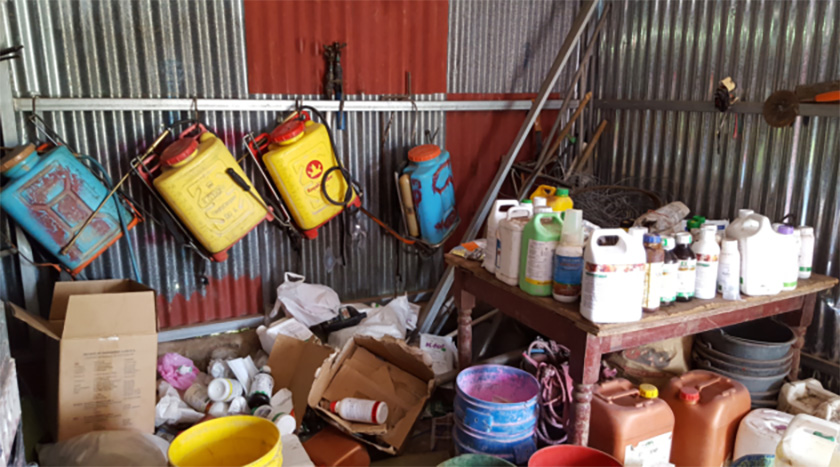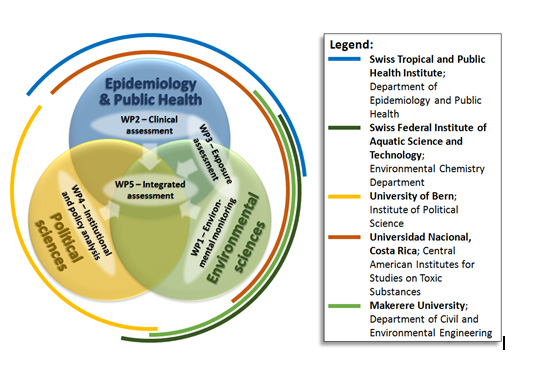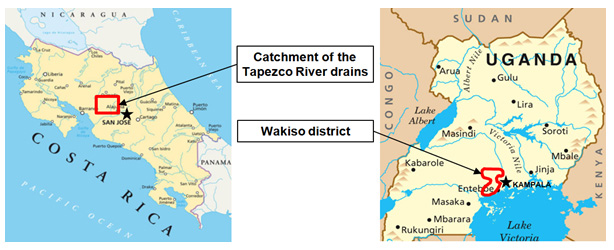Department Environmental Chemistry
PESTROP - Pesticide use in tropical settings

PESTROP is an inter- and transdisciplinary research project, studying environmental, health and institutional dimensions of pesticide use in tropical settings.
Background
Pesticides are intensively used in agriculture worldwide. While it is well established that pesticide exposure accounts for considerable morbidity and mortality on a global level, no studies from low- and middle-income countries (LMICs) exist that have examined in an integrative approach the interrelation between institutional determinants of pesticide use, actual practice of pesticide applications on small-scale farms, and associated human and environmental health effects.
Objective
The aim of this inter- and trans-disciplinary research project, combining environmental monitoring, epidemiology, clinical examinations and exposure assessment with institutional and policy analysis, is to deepen the understanding of the environmental, health and regulatory dimensions of pesticide use in agriculture in LMICs.
Methods
In two study areas in Costa Rica and Uganda, data is collected by means of: (i) environmental sampling campaigns in streams and drinking water wells; (ii) cross-sectional epidemiological surveys in small-scale farmers practising organic and conventional farming; (iii) in-depth analysis of official documents and legal texts; and (iv) interviews with key representatives of public agencies, non-governmental organisations and farmers associations. Comparative analysis and stakeholder workshops are at the core of the final integrated assessments.
Main project sponsor

The main sponsor of this project is the Swiss Network for International Studies (SNIS).
Research questions and hypotheses
Three overarching research questions are addressed in the two study areas of different cultural and political background:
- What are the mismatches between institutional determinants of pesticide use and actual practice of pesticide applications on small-scale farms?
- What are the related human and environmental health effects?
- Which changes in pesticide use practice and policy are needed to efficiently reduce human and environmental exposure to pesticides?
Research approach

This inter- and transdisciplinary research project – bringing together research institutes that have long-standing expertise in environmental sciences, epidemiology and public health and political sciences – is structured in 5 work packages (WP).
Study areas
In Costa Rica, the study investigates the catchment of the Tapezco River (50 km2) in the Zarcero. It is an area with extensive agricultural with small-scale farming systems ranging from conventional over sustainable to organic farming. The use of a broad range of hazardous pesticides has been reported. In Uganda the focus is on Wakiso district situated in the central part of the country, encircling the capital city, Kampala. Being close to Lake Victoria, the soil of Wakiso district is generally very fertile, resulting in abundant small-scale agricultural activities.

Expected results and relevance
Importance for science
The research project will make an important contribution to the understanding of the environmental burden of pesticides in water resources of agricultural settings in tropical LMICs. The comparative analysis shall lead the way forward in terms of future research in the area of pesticide application in tropical settings in LMICs and result in a convincing set of research driven policy recommendations at the national and regional level.
Importance for practice
Through the combination of environmental monitoring and exposure assessment, effective mitigation measures for reducing environmental and human exposure to pesticides will be identified, taking into account specific characteristics of small-scale farmers.
The findings of the institutional analysis will guide the definition of an integrated IRR that efficiently reduces human and environmental exposure to pesticides. This will set the basis for policy dialogues on pesticide use and regulation in Costa Rica and Uganda.
The value of those findings relevant for practice will be enhanced through:
- Restitution workshops with study participants and the farming community at large;
- The production and distribution of informative material that will translate research findings into recommendations for concrete action; and
- Stakeholder workshops at the local and national level in the frame of the integrated assessment
